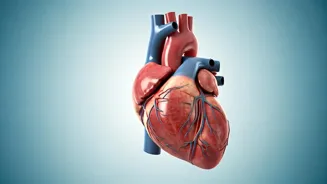Mind-Heart Connection
The article, guided by the insights of a cardiologist, begins by underscoring the crucial bond between mental state and cardiovascular health. It elucidates
how chronic stress and anxiety can significantly impact heart function, potentially leading to a cascade of health issues. Recognizing this relationship is the initial step towards proactive heart health management. The key takeaway is that the mind's well-being directly influences the physical health of the heart, prompting a need for mindful practices to maintain balance.
Tip 1: Deep Breathing
The first tip centers around the practice of deep breathing exercises. The cardiologist recommends taking slow, deep breaths to calm the nervous system. By focusing on inhaling deeply through the nose, holding the breath briefly, and exhaling slowly through the mouth, one can activate the parasympathetic nervous system, promoting relaxation. This simple technique can be used anywhere, anytime, and it's particularly effective when feeling overwhelmed or stressed. Regular practice enhances the body's natural relaxation response and reduces heart rate and blood pressure.
Tip 2: Meditation
Meditation is the second crucial tip mentioned. Regular meditation cultivates mental clarity and reduces stress hormones. The cardiologist suggests starting with just a few minutes of meditation each day, gradually increasing the duration as comfort grows. Focusing on the breath, a mantra, or a visual image helps to quiet the mind and reduce racing thoughts. The consistent practice of meditation can lead to a greater sense of calm and improved emotional regulation, thus supporting heart health. It is also an excellent way to improve focus and self-awareness.
Tip 3: Progressive Relaxation
Progressive muscle relaxation forms the third tip. This technique involves systematically tensing and releasing different muscle groups in the body. Beginning with the toes and working upwards, one contracts and then releases each muscle group, paying attention to the sensation of relaxation that follows. This process helps to release physical tension and promote a sense of calm. It is an effective method for reducing stress-related physical symptoms and can be particularly beneficial for those who hold tension in their bodies. The regular practice supports overall stress reduction and enhances a feeling of well-being.
Tip 4: Mindfulness
The fourth tip is all about integrating mindfulness into everyday life. This means paying full attention to the present moment without judgment. It encourages individuals to be aware of their thoughts, feelings, and surroundings. This approach encourages a non-reactive stance, preventing small problems from spiraling into larger anxieties. The practice can be cultivated while eating, walking, or performing any routine activity. It increases self-awareness and helps in managing stress more effectively. Embracing mindfulness leads to a greater appreciation of life and reduces the effects of stress.
Tip 5: Gratitude
The final piece of advice highlights the power of gratitude. This tip emphasizes the importance of regularly acknowledging and appreciating the positive aspects of life. Practicing gratitude can involve keeping a gratitude journal, where one lists things they are thankful for daily. It helps shift the focus away from negative thoughts and feelings. It can improve mood, reduce stress, and boost overall well-being. The cardiologist suggests reflecting on positive experiences and relationships to reinforce feelings of thankfulness, contributing to a more optimistic outlook and healthier mental state, subsequently benefitting heart health.





















